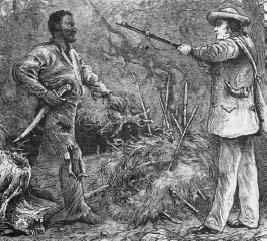Civil Rights and ProtestsSlave Revolts |
When did the first slave revolt of magnitude occur? |
In Southampton County, Virginia, on August 21 and 22, 1831, Nat Turner (1800–1831), minister and slave, led what has been recognized as the first slave revolt of magnitude. The revolt was crushed, but only after Turner and his band had killed some sixty whites and threw the South into panic. After hiding out, Turner was captured on October 30, 1831, and hanged in Jerusalem, Virginia, on November 11. Thirty other blacks were also implicated and executed. It was not until John Brown’s 1859 raid on Harpers Ferry, Virginia, that another slave revolt or conspiracy became known. Turner was born to African-born slaves of Benjamin Tucker, in the Tidewater region of southeast Virginia, near North Carolina. After several attempts to escape slavery, his father finally succeeded and emigrated to Liberia. Although slaves were forbidden to read or write, Turner did so with ease and became a wonder to the slave community. He became an itinerate preacher, using his travel to learn the terrain of Southampton, Virginia. He also identified slave and free blacks who would attend his sessions and prepare for what he called the great “migration” that God envisioned for them. Turner also claimed to have received signs that it was time for him to lead his rebellion. Finally, on the night of August 21, when whites had left their churches and settled in for the night, Turner and his insurrectionists moved swiftly in a surprise attack on plantations in the Southampton countryside. After he lost his tactical advantage, Turner grew concerned for his own survival and hid underground for six weeks. He was captured on October 30; he offered no testimony in court, nor did he allow defense on his behalf. His famous deposition became known as The Confessions of Nat Turner; it was later published, and copies sold out quickly.

A wood engraving depicting the capture of slave revolt leader Nat Turner in 1831.
